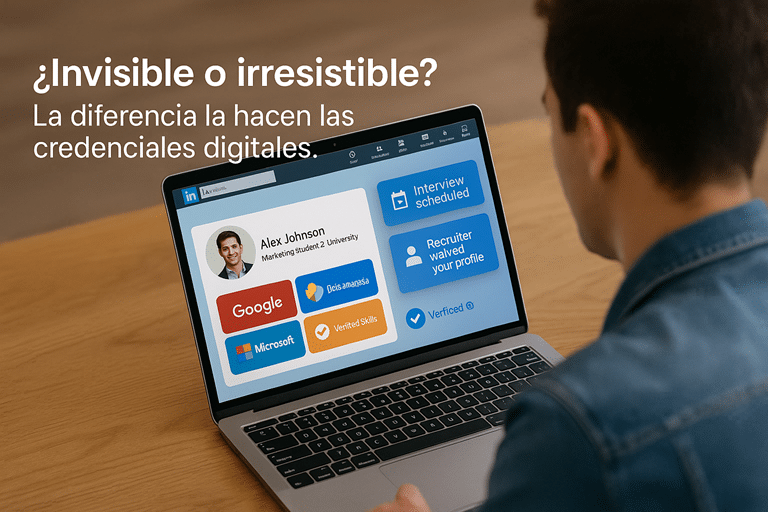Technological change is constant and the skills needed for the job are updated regularly. In this context, digital credentials play an important role in skills development, as they allow people to demonstrate their knowledge and skills quickly, easily and securely.
According to BID, digital credentials are a verifiable online recognition of skills or knowledge that an individual has acquired. These digital representations contain detailed information including who received it, who issued it, the achievements achieved, and the criteria for issuing it.
Digital credentials can be issued by educational institutions, bootcamp-type training organizations, or companies. However, they can be of different types, such as certificates, diplomas or badges.
Contributions of digital credentials in the development of skills
Digital credentials provide the following benefits to skill development:
- They recognize and validate learning: They can be awarded by a wide range of organizations, allowing them to recognize the learning that is acquired through online courses, workshops, events, personal projects, etc.
- They facilitate the transfer of skills: They are portable and easy to share, making it easy for people to demonstrate their skills to employers, clients or educational institutions.
- They motivate continuous learning: They can be a way to recognize people’s efforts and achievements, which can motivate them to continue learning and developing their skills.
- They can be collected: It is possible to create a skills wallet and collect all the credentials earned, which motivates and adds value to the credentialed.
Skills that can be recognized with digital credentials
- Specialized knowledge: When a person enters an area such as marketing, business, languages, chemistry or whatever, they can be recognized for those specific skills and knowledge that they acquire and that make them competent to practice said profession. Furthermore, if he is recognized correctly then he will be able to demonstrate these capabilities in a simple way when seeking a job or promotion.
- Teamwork. The ability to work effectively with others to achieve a common goal is essential in today’s world of work. Professionals who can collaborate and communicate effectively with others are more valued by employers.
- Communication. The ability to communicate ideas clearly and concisely is an essential skill for any professional. Professionals who can communicate effectively with clients, colleagues, and superiors have a competitive advantage.
- Critical thinking. The ability to analyze information and make informed decisions is a key skill in the 21st century. Professionals who can think critically are better able to solve problems and adapt to changes.
- Problem resolution. The ability to identify and solve problems is another essential skill in today’s world of work. Professionals who can solve problems effectively are valued more by employers.
- Creativity. The ability to think outside the box and generate new ideas is an increasingly important skill in the 21st century. Professionals who can be creative are better able to innovate and find solutions to complex problems.
- Leadership. The ability to inspire and motivate others is a valuable skill for any professional. Effective leaders can create successful teams and achieve organizational goals.
- Adaptability. The ability to adapt to change is a key skill in today’s world of work. Professionals who can adapt to change are better able to stay competitive in the job market.
- Initiative. The ability to take initiative and take action is a valuable skill for any professional. Professionals who take initiative are more able to succeed in their careers.
- Service orientation. The ability to focus on clients’ needs is an important skill for any professional who works with clients. Professionals who have a service orientation are better able to create positive relationships with clients.
- Orientation to results. The ability to focus on results and achieve goals is an important skill for any professional. Professionals who are results-oriented are more able to succeed in their careers.
- Time management. The ability to manage time effectively is an essential skill for any professional. Professionals who can manage their time effectively are better able to meet their deadlines and achieve their goals.
- Organization. The ability to organize and maintain order is a valuable skill for any professional. Professionals who are organized are better able to be productive and avoid stress.
- emotional intelligence The ability to understand and manage one’s own emotions is an important skill for any professional. Professionals who have emotional intelligence are better able to build positive relationships and succeed in their careers.
- Continuous learning capacity. The ability to learn and adapt to new situations is a key skill in today’s world of work. Professionals who can learn continuously are better able to stay competitive in the job market.
Examples of using digital credentials
Digital credentials can be used in a variety of contexts, including:
- Education: Digital credentials can be used to certify completion of online courses, certification programs, or academic programs.
- Training: Digital credentials can be used to recognize learning acquired in training courses, workshops or events.
- Job: Digital credentials can be used by employers to evaluate the skills of job candidates.
- Personal development: Digital credentials can be used to recognize learning acquired in personal projects or in the development of non-work related skills.
Digital credentials and skills go hand in hand. One allows the other to be exposed in the way the student or person needs it. Therefore, at this moment, it is almost mandatory, for any organization that wants to be at the forefront, to seek its implementation.
Subscribe to blog here and receive all our content







